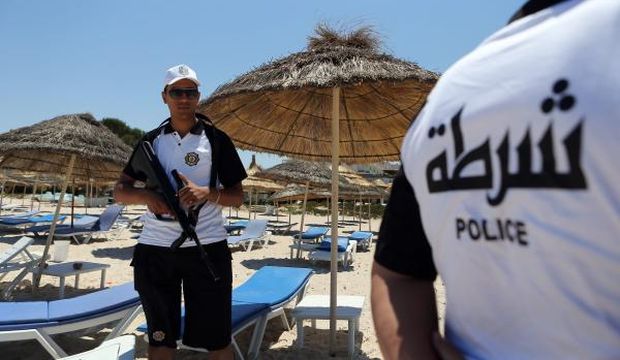
Tunisian policemen keep watch on the beach where tourists were shot dead in front of the Hotel Imperial Marhaba in Sousse, Tunisia, on July 1, 2015. (EPA/Mohamed Messara)
Tunis, Asharq Al-Awsat—An initial report by authorities in Tunisia into last week’s attack at a tourist resort in the coastal city of Sousse has found that both the country’s security services and the hotel did not do enough to stop the massacre.
Thirty-nine people, mostly British tourists, were killed when a gunman opened fire on people at the beach of the Hotel Rie Imperial Marhaba.
Tunisia’s President Beiji Caid El-Sebsi said in a radio address that “an investigation has been conducted into the terrorist attack, which has shown evidence of security shortcomings” in Sousse.
Sebsi added that “necessary measures would be taken immediately” to address the problem.
Security was heightened across tourist sites and elsewhere since the start of Ramadan, Sebsi said, but he admitted the authorities “could never have expected this [attack] to happen on the beach.”
The government has said it plans to deploy around 1,000 police and security forces across tourist sites in the country this week.
Reports from Tunisia now suggest three top local security officials will lose their jobs over the attack.
This comes as Tunisian authorities made several arrests in the country linked with the attack. They have said that the gunman Seifeddine Rezgui had a “network” of accomplices who aided in the attack.
Reports have suggested twenty-four-year-old Rezgui bypassed security in the hotel by reaching the beach by boat or jet-ski. He began firing on people, mainly tourists, on the beach with a Kalashnikov rifle he had hidden under a parasol.
Interior Minister Najem Gharsali also admitted there had been a major security breach during the attack and asked how Rezgui was allowed to wander around the beach calmly with a rifle, carrying out the killings over a period of 45 minutes.
Gharsali criticized security in the area for not responding quickly enough to the incident.
Some reports from Tunisia have said Rezgui had been known to authorities, but only in relation to drug-use offences.
The government has said it believes Rezgui received training at a jihadist camp in Libya, the same camp where the men who carried out another attack on tourists in the country—at the Bardo Museum in the capital Tunis last March—were trained. The government says Rezgui was receiving his training at the time when the Bardo attack took place.
